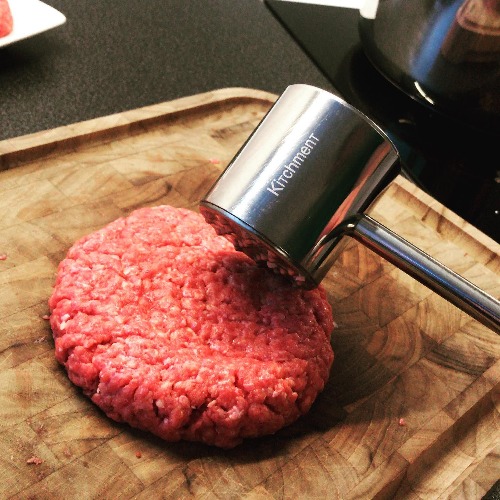Are you a home chef who is looking for a natural and effective way to tenderize your meat? Have you ever tried to marinate your meats with various ingredients in the fridge, only to be disappointed when the meat still turns out too tough and dry?
Well, don’t despair! You don’t have to buy expensive meat tenderizers from the store to get tender and juicy meat. There are actually a few natural options that you can use to tenderize your meats. In this article, we are going to share with you 10 natural alternatives to tenderize the meat that you can easily find in your kitchen.
We will cover everything from using natural acids and enzymes to using ingredients like yogurt and baking soda to get the job done. So if you’re looking for a natural and easy way to tenderize your meat, then keep reading!
How Does a Meat Tenderizer Work?

In essence, meat tenderizers are enzymes that are added to the meat before it is cooked. By breaking up the fibrous connective tissues in the meat, these enzymes make it softer and easier to chew.
So, how does a meat tenderizer actually work? Here’s a quick breakdown:
1. By breaking down the fibers inside the meat, tenderizers make it easier to digest.
2. The enzymes also digest the meat, making it softer and more tender.
3. As the tenderizers draw out moisture from the meat, the result is a more flavorful, juicier dish.
4. The tenderizers reduce the fat, making it easier to cook without the fat becoming overly greasy.
These enzymes are most effective when left to sit on the meat for at least 30 minutes before cooking. This gives the tenderizers time to loosen the connective tissue in the meat, allowing it to be more comfortable to chew.
Are Meat Tenderizers Effective?
The answer is yes! A meat tenderizer breaks down the tough cuts of meat, making it softer and easier to bite into. It also breaks down the protein strands, allowing the juices and flavors to be absorbed more quickly, resulting in a juicier, flavorful dish.
When using a meat tenderizer, there are several factors to consider. The type of meat, the amount of time you have available to tenderize, and the type of tenderizer you use all affect the outcome.
For example, a tougher cut of meat, such as a chuck roast or brisket, will require more time and a more aggressive tenderizer. A loin roast or filet mignon, on the other hand, will require less time and a less aggressive tool. The effectiveness and efficacy of natural meat tenderizer can be seen in this PMC report.
Top 10 Natural Meat Tenderizers
Meat tenderizers are a kitchen essential for those who enjoy grilling and barbecuing. It helps to soften the tough and chewy proteins in the meat, making it easier to cook and more delicious to eat. So let’s look at some of the best natural meat tenderizers:
1. Citrus Fruits

Citrus fruits, such as limes, lemon and oranges, contain acids that are great natural meat tenderizers. The acidity of the citrus juices dissolves tough proteins in the meat and improves its tenderness. The acids in these fruits work to tenderize the meat without making it too acidic or overly soft.
Using citrus fruits as a natural meat tenderizer substitute is a great way to add flavor to your dish. For example, adding lemon or lime juice to a marinade can give your meat a bright and acidic flavor. Or, you can use orange juice in a marinade for a sweeter and more subtle flavor.
If you are using citrus fruits as a meat tenderizer, it’s important to not leave the citrus juices in the marinade for more than 45-60 minutes. If the juices are left in for too long, the acidity can cause the meat to become too soft and mushy.
2. Baking Soda
Baking soda can be used to tenderize meat in two ways: either by rubbing it into the meat directly or by making a paste of the baking soda and water. To maximize the tenderizing effect of the baking soda, the meat should be left in contact with it for several hours. Additionally, to ensure that all the baking soda has a chance to work its magic, the meat should be cut across the strand and thinly sliced.
Once the baking soda has had its time to do its job and tenderize the meat, it’s important to remove any excess baking soda before cooking. Not only does this help to get rid of any baking soda flavor that may not have been desirable, but it also helps to keep the meat juicy and flavorful.
Using baking soda as a natural meat tenderizer may require some experimentation to get the desired results, but it can be a great way to ensure that the meat remains tender and juicy. For those looking for a more natural and cost-effective solution, baking soda is definitely worth a try.
3. Heating
Heating is a simple way to tenderize tough cuts of meat. The heat helps to break down the tough connective tissues that make the meat tough, and it also helps to bring out the flavor and natural juices of the meat. This makes it tender and juicy and makes the overall eating experience more enjoyable.
The key to successful heating is to heat the meat slowly either in stock or over herbs and vegetables. This helps to bring out the flavors, and it also helps to break down the connective tissues in the meat. As the meat is heated, it will become what is known as “fork tender,” meaning it can be easily pierced with a fork. This is an important step in tenderizing the tougher cuts of meat, as it helps to make them more enjoyable to eat.
Once the meat has been heated sufficiently and is fork tender, it is ready to be cooked. The best way to cook tenderized beef is to use high, direct heat. This helps to quickly seal in the juices and flavor, and it also helps to keep it from drying out. When cooking tenderized beef, it is important to watch the temperature carefully and to not overcook the meat.
4. Vinegar
The acetic acid in vinegar breaks down the tough fibers that can cause a piece of meat to be tough and chewy. By adding a tablespoon of vinegar to your cooking liquids or marinating your meat for a short time before you cook, you can make a big difference in the final product.
When using vinegar as a meat tenderizer, the acidity of the vinegar helps to soften the meat fibrous structure. This allows for a more tender, juicy, and flavorful piece of meat. It is also a great way to add flavor and complexity to a dish.
The most common type of vinegar used as a meat tenderizer is white vinegar. This type of vinegar has the highest acidity level, so it can efficiently dissolve tough fibers. It also has a mild flavor that won’t overpower the taste of the dish.
Balsamic or apple cider vinegar can also be used as a meat tenderizer. These types of vinegar are slightly less acidic than white vinegar, so they are a bit milder in flavor. However, they still effectively weaken the tough fibers to make a more tender piece of meat.
To use vinegar as a meat tenderizer, you can either mix it with your cooking liquids or marinate it before cooking. This will give the vinegar time to work its magic and break down the tough fibers in the meat.
5. Ginger
When using ginger as a natural meat tenderizer, you can use either slices of ginger or ginger pulp. When you add ginger to your meat, you should leave it on the surface for best results for 90 minutes minimum. This will give the enzymes enough time to do their job and assist in breaking down the meat’s proteins.
When it comes to marinades, ginger can be a great addition and help make the meat more tender. It pairs well with garlic, soy sauce, and other acidic ingredients and can help bring out the flavour of the marinade. The enzymes in ginger can also facilitate the digestion of proteins in the marinade, so it can be absorbed more easily by the meat.
6. Papaya Pulp
Are you looking for a way to tenderize meat without the use of harsh chemicals or complicated marinades? If so, papaya pulp might be the answer you’re looking for! Natural meat tenderizers such as papaya pulp have been used for centuries to soften and break down the fibers of tough cuts of meat.
Unlike many chemical-based meat tenderizers, papaya pulp is a natural and effective way to break down the proteins in your favorite cuts of steak, chicken, or pork. It can take the toughness out of any cut of meat and make it more tender and flavorful. It’s also a great way to add a fruity flavor to your favorite dishes.
Take the flesh of a ripe papaya and mash it into a pulp that can be used as a natural meat tenderizer. Using the papaya pulp, lightly coat the meat you’re going to cook. It takes about a couple of teaspoons of pulp per half a kg. If you’d like, you can also poke the meat with a fork or knife first to help the papain reach the center of the piece for even tenderization.
Once you’ve coated the meat in the papaya pulp, let it sit for a few hours to allow the tenderizing enzymes to work their magic. However, don’t leave the meat in the marinade too long or you might end up with a protein mush or slime. Cook the meat within a couple of hours of marinating it for the best results.
7. Pineapple Juice
If you’re looking for a safe, natural way to tenderize meat, you might want to consider using pineapple juice. Bromelain, an enzyme found in pineapples, is a natural meat tenderizer. To use it, you simply need to remove the pineapple skin, put the flesh in a blender and blend it into a pulp. You can then apply this pulp over the surface of the meat and let it sit for up to an hour.
Alternatively, you can also pour pineapple juice over the meat and marinate it in the fridge. As a result of the acidity in pineapple juice, the fiber in the meat will be broken down and made more tender. It will become more tender the longer you marinate it.
As a meat tenderizer, pineapple juice should not be cut corners. The enzymes in bottled or cooked pineapple won’t work, as the heating process destroys them, and nothing will happen. Fresh pineapple is the way to go, and you can even freeze it for later use if you prefer.
8. Salt

Salt is an incredibly versatile ingredient that can be used in a variety of different ways, including as a natural meat tenderizer. With a few simple steps, you can use salt as a substitute for traditional meat tenderizers to make your meats softer and more flavorful.
In order to prepare the meat, start by spreading table salt over it. This should be done liberally and evenly, so that the salt can penetrate the meat. Allow the salt to sit for at least one hour before rinsing off the excess.
After the hour has passed, thoroughly rinse the meat with cold water. This will help to remove any excess salt that may have been absorbed into the meat. After rinsing, the meat should be ready for cooking.
When you are cooking the meat, it is important to remember that the salt will give the meat a salty flavor. If you are using a marinade or sauce, make sure to adjust the seasoning accordingly. You may want to use less salt if you are using a marinade or sauce, as the salt will add more saltiness to the overall dish.
Using salt as a substitute for meat tenderizer can add a unique flavor to your dishes that can’t be achieved with other types of tenderizers. It is important to remember, however, that the salt can have a strong flavor if used in large quantities. Be sure to use it sparingly to get the desired results.
9. Figs
Figs are a wonderful alternative to conventional meat tenderizers. As a result of the enzyme ficin, they provide a great complement to chemicals and additives used in meat tenderizers.
Figs can add a high-end flavor profile to your dish while also enhancing the texture of your chosen meat. This makes them an ideal option for tenderizing tough cuts of meat, such as beef, pork, chicken, and lamb.
To get the most out of your figs as a meat tenderizer, slice them and place them on both sides of the meat. This allows the juices and enzymes of the figs to fully absorb into the meat and tenderize it.
The figs can be left on the meat for up to an hour before cooking. This allows the flavors of the figs to really sink into the meat and tenderize it.
Once you’ve let the figs do their work, you can then cook the meat however you like. The tenderizing enzymes of the figs will have done their job, and you’ll be left with a tender, juicy, and flavorful meal.
10. Tea
One of the most underrated ingredients that can be used to tenderize meat is tea! Black tea, specifically, is known to contain natural tannins, which are compounds that are great for breaking down proteins in meat. This can help to make your beef, chicken, or whatever else you’re cooking much more tender and flavorful.
So, how can you use tea to tenderize your meat? The process is actually quite simple. The only thing you need is 1-2 cups of strong black tea and the meat of your choice. Let the meat soak in the tea for 1 day, and the more you soak it, the more tender the meat will be.
You’ll be amazed at the results! The tea will give the meat a unique and delicious flavor that you can’t get from any other ingredient. Plus, it’s a much healthier option than some of the heavily processed tenderizers and marinades that can be found in stores.
Conclusion:
In conclusion, there are plenty of natural options that can be used as a substitute for a meat tenderizer. From acidic ingredients like vinegar and lemon juice to natural enzymes found in fruits and vegetables, these 10 natural options can help enhance the flavor and texture of your favorite meats. With the right combination of ingredients, you can create a delicious meal that will tantalize your taste buds and leave you wanting more.
FAQs:
What is the best meat tenderizer substitute?
The best meat tenderizer substitute depends on the type of meat, the desired flavor, and the amount of time available for preparation. Among the above meat mallet is the best meat tenderizer substitute.
How do these natural ingredients work as a meat tenderizer?
These natural ingredients help to break down the proteins and collagen fibers in the meat. This makes the meat more tender and easier to chew.
Are there any safety concerns with using natural meat tenderizers?
When using natural meat tenderizers, it is important to follow the instructions on the product carefully. If used in excess, the natural ingredients can make the meat too soft and mushy.

Mark is the founder and head writer of Meat Savory. He’s a passionate meat lover who has been cooking and writing about meat for over 10 years. He is also a meat safety specialist and has been testing and inspecting meat products for over 5 years. Learn More!

